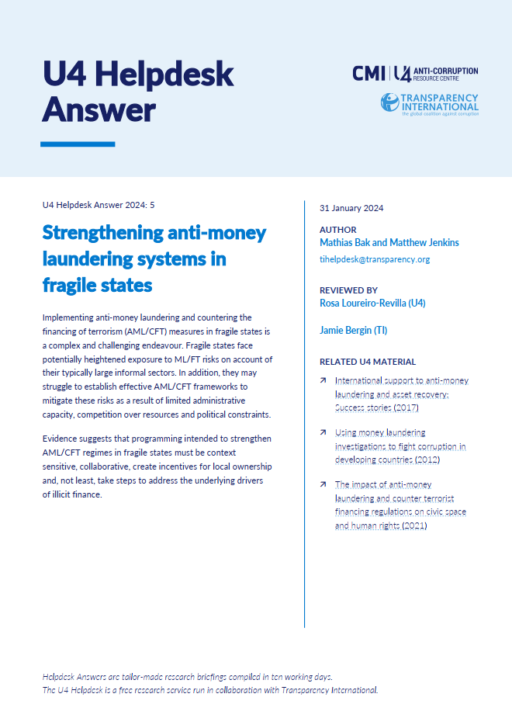
This Anti-Corruption Helpdesk brief was produced in response to a query from a U4 Partner Agency. The U4 Helpdesk is operated by Transparency International in collaboration with the U4 Anti-Corruption Resource Centre based at the Chr. Michelsen Institute.
Query
Please summarise the evidence on the lessons learned on how to undergo institutional strengthening of AML systems in fragile states.
Summary
Implementing anti-money laundering and countering the financing of terrorism (AML/CFT) measures in fragile states is a complex and challenging endeavour. Fragile states face potentially heightened exposure to ML/FT risks on account of their typically large informal sectors. In addition, they may struggle to establish effective AML/CFT frameworks to mitigate these risks as a result of limited administrative capacity, competition over resources and political constraints.
Evidence suggests that programming intended to strengthen AML/CFT regimes in fragile states must be context sensitive, collaborative, create incentives for local ownership and, not least, take steps to address the underlying drivers of illicit finance.
Main points
- Tackling sophisticated forms of financial crime relies on considerable state capacity, resourcing and political backing. It is precisely these conditions that are likely to be absent in fragile settings.
- Implementation of AML/CFT measures in fragile states has traditionally tended to focus on technical compliance over feasible reform objectives and de facto enforcement.
- Donor-driven approaches typically aim to enhance the institutional, legal and operational frameworks in aid-recipient countries. Typical modalities include technical assistance, capacity building and policy reform efforts.
- Addressing AML/CFT deficits in fragile states requires an in-depth understanding of institutional needs, political economy challenges and a tailored strategy designed to secure buy-in from in-country actors.
- The active involvement of private sector entities and collaboration between public and private sectors in the development and implementation of AML/CFT strategies is essential to success.
- There are long-standing concerns about the unintended consequences of AML/CFT measures, particularly their impact on financial inclusion. Not giving due consideration to these potential unintended consequences may risk incentivising informal economic activities and increase the ML/TF risks.
Contents
- Introduction
- Challenges of AML/CFT in fragile states
- Current approaches to institutional strengthening of AML/CFT systems in fragile states
- Lessons learned in strengthening AML/CFT systems in fragile states
- References
Caveat
Anti-money laundering is often grouped with combating the financing of terrorism (AML/CFT), including by the IMF, World Bank and the Financial Action Task Force (FATF). Nevertheless, as the IMF itself has stated, “while ML and TF share common attributes and exploit the same vulnerabilities in financial systems, they are distinct concepts and present different risks” and that they should be assessed separately (IMF 2023: 8). This paper focuses on strengthening robust AML systems, rather than CFT.
Authors
Mathias Bak and Matthew Jenkins, [email protected]
Reviewers
Rosa Loureiro-Revilla (U4)
Jamie Bergin (TI)
Date
14/02/2024
Tags
 Download PDF
Download PDF
